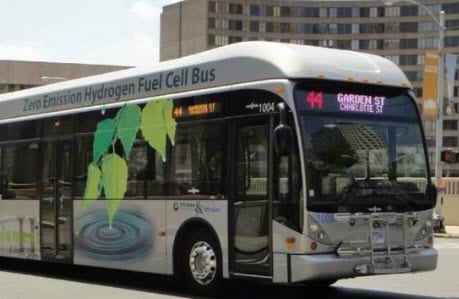
CTE launches test of hydrogen fuel bus
May 3, 2013 0 By Bret WilliamsCTE aims to show off viability of hydrogen fuel
Georgia’s Center for Transportation and the Environment (CTE) has launched its new hydrogen-powered bus project this week, featuring a vehicle developed by Proterra. The bus makes use of hydrogen fuel cells developed by Hydrogenics, a leading producer of fuel cell energy systems. The project is meant to test the viability of hydrogen fuel in the realm of public transportation. Hydrogen has been growing increasingly common in public transit outside of the U.S. and has often won acclaim as a cost effective alternative to traditional energy solutions.
Bus to head to Texas and Washington DC
CTE will begin demonstrating its new hydrogen-powered bus in Austin, Texas. The state’s Capital Metropolitan Transportation Authority with operate the bus for a period of one year in order to show off the capabilities of hydrogen fuel. After one year, the bus will move to Washington D.C., where it will be used in a similar fashion by the District Department of Transportation. In this way, CTE believes that the project will help expand the exposure of hydrogen fuel and help states and residents become more comfortable with the concepts surrounding hydrogen transportation.
Bus lauded for its efficiency
The Proterra bus has been lauded for its efficiency and durability. The bus is capable of running for long periods of time before needing to be refueled due to the fact that it has been designed specifically for hydrogen fuel cells. The fuel cells from Hydrogenics will power the bus and ensure that the bus produces no harmful emissions into the environment. These energy systems will receive the fuel they need from private fuel stations operated by each state’s transportation authority.
Hydrogen gains ground in public transit
Hydrogen fuel has been gaining a great deal of momentum in the transportation sector. In terms of public transit, hydrogen is considered an effective way to cut costs associated with traditional fuels, thus making this form of renewable energy somewhat attractive to governments. Fuel cells, however, are quite expensive, which has served as a significant challenge to the mass adoption of hydrogen fuel cells in the world of public transportation.
About The Author
Bret Williams is a writer and researcher with a passion for trains and renewable energy technology. With over 20 years of experience, he is a recognized expert in the field of sustainable energy, including waste to energy and hydrogen storage solutions. Growing up, Bret's love for trains sparked an interest in energy and transportation systems. This passion led him to explore the world of renewable energy, where he discovered his true calling. As a writer, Brett uses his knowledge and expertise to provide insightful articles and whitepapers on cutting-edge topics related to sustainable energy. Bret is a passionate advocate for the environment and believes that renewable energy is crucial to preserving our planet for future generations. He strives to promote the latest sustainable energy initiatives, new technologies, and emerging trends in the sector through his writing.



 HFN News is your leading source for fresh hydrogen and renewable energy updates. Amid the fast-paced growth of hydrogen companies, we provide top-notch news and insights about this exciting sector. Our coverage spans from hydrogen cars to global sustainable initiatives, and we highlight the latest in green jobs and developing hydrogen hubs. We invite you to share your local hydrogen news and explore today’s renewable energy job listings on our site. Thanks for choosing HFN News as your trusted guide to the hydrogen and renewable energy world!
HFN News is your leading source for fresh hydrogen and renewable energy updates. Amid the fast-paced growth of hydrogen companies, we provide top-notch news and insights about this exciting sector. Our coverage spans from hydrogen cars to global sustainable initiatives, and we highlight the latest in green jobs and developing hydrogen hubs. We invite you to share your local hydrogen news and explore today’s renewable energy job listings on our site. Thanks for choosing HFN News as your trusted guide to the hydrogen and renewable energy world!